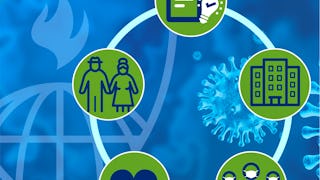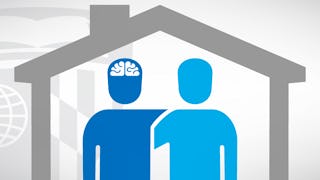SARS-CoV-2, the virus that causes COVID-19, poses a high risk for assisted living communities due to residents’ age, health status, and communal living environment. The COVID-19 response has largely focused on nursing homes, leaving assisted living communities in the United States with fragmented guidance on how to respond to COVID-19 challenges. This course provides comprehensive instruction and resources for administrators and direct-care staff of assisted living communities.


Strategies for Assisted Living Communities during COVID-19



Instructors: Morgan Katz
9,000 already enrolled
Included with
(268 reviews)
Recommended experience
What you'll learn
Develop comprehensive emergency preparedness plans related to COVID-19 practices and procedures
Employ effective COVID-related infection prevention strategies and communication methods within your community
Understand effective testing strategies and the utility of contact tracing and cohorting within Assisted Living Community settings
Identify methods for promoting staff and resident well-being during COVID-19
Skills you'll gain
Details to know

Add to your LinkedIn profile
11 assignments
See how employees at top companies are mastering in-demand skills

There are 6 modules in this course
This module provides a foundational understanding of Coronavirus-19 disease (COVID-19), why Assisted Living communities are at high risk of infection, and how to structure your emergency preparedness plan for the pandemic.
What's included
5 videos4 readings1 assignment
This module covers several infection prevention topics to help you develop and implement practices to reduce COVID-19 transmission. First, it distinguishes how policies, procedures and practices each play a role in preventing and responding to COVID-19. Then it describes factors that contribute to COVID-19 outbreaks and how to prevent them, the proper use of PPE, cleaning and disinfection, staffing considerations, and communication strategies for different stakeholders.
What's included
9 videos2 readings4 assignments
This module addresses the fundamentals on how to create and implement testing policies in your community. It explains the various types of tests available, including the pros and cons of each, and how this may impact practices and outcomes in your community. It also provides a background on how to contact trace in Assisted Living Communities and cohort infected or exposed residents and staff accordingly.
What's included
7 videos2 readings2 assignments
This module discusses reasons for increased stress, anxiety, and feelings of isolation among staff and residents and what types of programs and policies can be implemented to promote well-being.
What's included
4 videos1 reading1 assignment
This module discusses how to create partnerships with local and state health agencies to support your community’s response to COVID-19. It also provides resources about the COVID-19 vaccinations, distribution, and messaging.
What's included
1 video4 readings2 assignments
The Final Assessment asks about changes you've made to your community's emergency response strategies while taking this course. Prior to starting the Quiz, read the Overarching Resources section and revisit any uncompleted assignments or items that may have required follow up with others in your community.
What's included
1 reading1 assignment1 plugin
Instructors



Offered by
Explore more from Healthcare Management
 Status: Preview
Status: PreviewJohns Hopkins University
 Status: Preview
Status: PreviewThe University of North Carolina at Chapel Hill
 Status: Preview
Status: PreviewJohns Hopkins University
 Status: Preview
Status: PreviewUniversity of Toronto
Why people choose Coursera for their career




Learner reviews
268 reviews
- 5 stars
87.31%
- 4 stars
9.70%
- 3 stars
1.86%
- 2 stars
0.37%
- 1 star
0.74%
Showing 3 of 268
Reviewed on Apr 23, 2021
Now I have detailed understanding of strategies for assisted living communities during SARS 2 COVID 19. Thank you.
Reviewed on Aug 21, 2022
In a week I learned a lot as regards managing COVID-19 ; infections, testings, isolation and quarantine, treatments, control of infections, recovery and a lot more.
Reviewed on Mar 17, 2022
Excellent, comprehensive with great interviews and resources.

Open new doors with Coursera Plus
Unlimited access to 10,000+ world-class courses, hands-on projects, and job-ready certificate programs - all included in your subscription
Advance your career with an online degree
Earn a degree from world-class universities - 100% online
Join over 3,400 global companies that choose Coursera for Business
Upskill your employees to excel in the digital economy
Frequently asked questions
This course provides comprehensive instruction and resources for administrators and direct-care staff of assisted living communities on best practices for the response to COVID-19. Topics discussed include development of emergency preparedness plans, infection and outbreak prevention, staffing considerations, testing, and contact tracing. The course also covers strategies for communicating with stakeholders, promoting resident and staff well-being, and leveraging health departments and other agency resources.
Due to a generous grant, you can enroll in this course for free! The promotional price will be applied to your purchase automatically. You will need to enroll via a web browser on either a computer or a mobile device and not via the Coursera mobile app to enroll for the course and certificate for free. Unfortunately, the promotional price is not redeemable through the mobile app. If you have paid for this course because you enrolled through the app, please contact Coursera’s Learner Service team to arrange for a refund.
Please note the difference between auditing the course and enrolling for free. While both options cost nothing, “auditing” the course means you will not have access to the assessments nor will you be issued a certificate upon completion of the course. Choose the “Enroll for free” option to access the assessments and get a certificate upon completion. For a full explanation of all enrollment options, review the Enrollment Options article on Coursera’s Learner Help Center.
This course is directed towards training administrators as well as direct-care staff in best practices to prepare and respond to outbreaks of COVID-19 in your assisted living community. It can be incorporated into training practices of staff and administrators as an important component of your community’s response to the pandemic.



